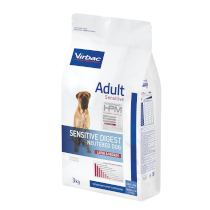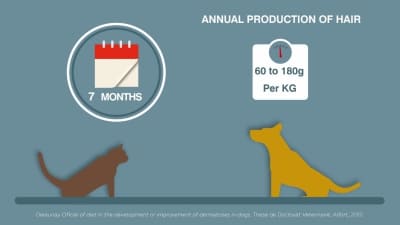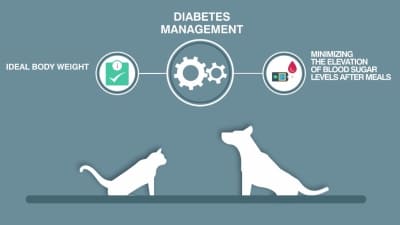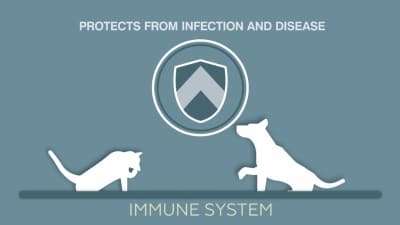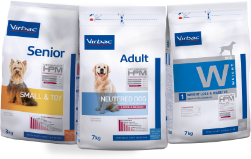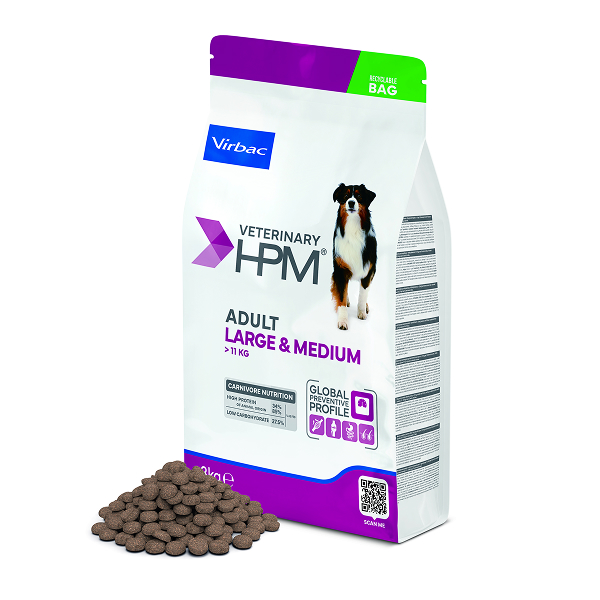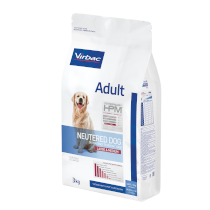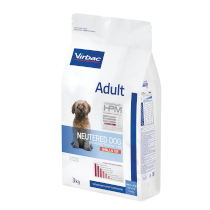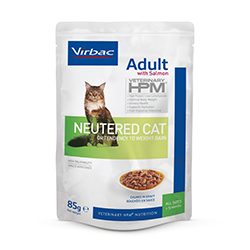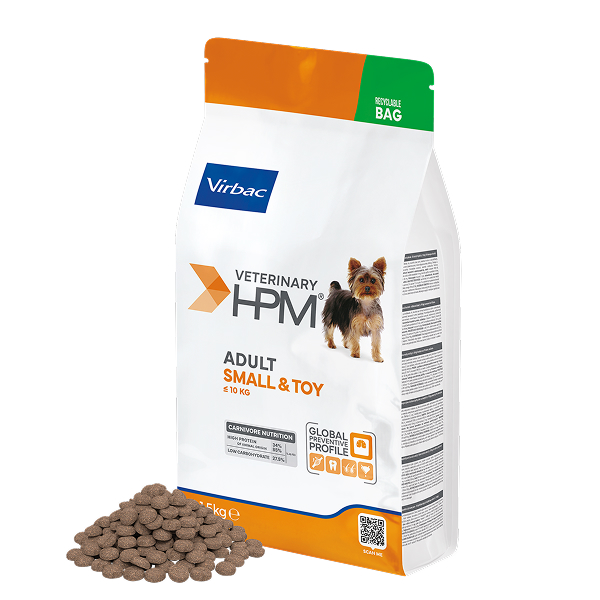Proteins play an important role as they are an essential component of the skin and hair. The hair is made up of 95% protein, of which almost 1/3 is used for skin renewal and hair growth. The role of proteins is therefore fundamental to the beauty of the skin and coat.
Adult Neutered Sensitive Digest Dog Food - Large & Medium
Some medium and large breeds are prone to digestive sensitivity. This is related to their anatomical and physiological specificities.
- Large breed (≥ 25 kg), from 18 months with digestive sensibility
- Medium breed (11-24 kg), from 12 months with digestive sensibility
- High digestive tolerance & supports digestive system
- Improve faeces consistency
Available sizes:
- 3 kg
- 12 kg
Nutrion for carnivorious paragraph
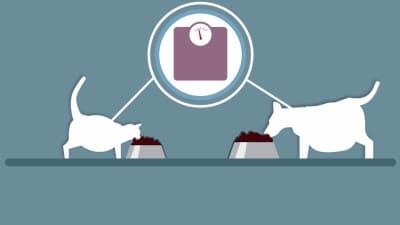
By promoting satiety and the lean body mass development (including muscle) rather than fat, protein helps dogs and cats maintain a healthy weight. Fibre is also added as well as L-carnitine to help limit fat storage.
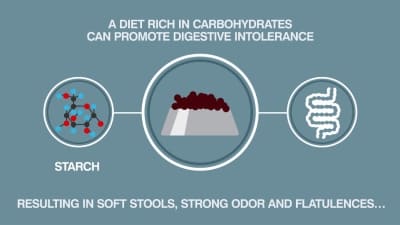
A food that is too rich in carbohydrates can be poorly tolerated and cause loose stools and unpleasant odours.
Low carbohydrate levels, well digestible proteins and the addition of functional ingredients (lactobacilli, montmorillonite, sepiolite, etc.) help to maintain good digestive tolerance.
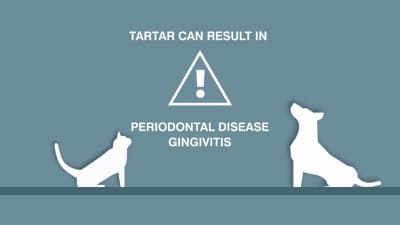
Pentasodium triphosphate supplementation limits tartar formation and contributes to good oral health
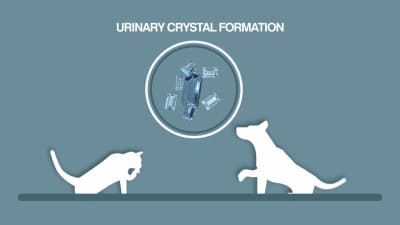
By stimulating drinking and promoting naturally acidic urine, protein helps to maintain good urinary health.
A functional ingredient, cynarin, is also added to help dilute his urine.
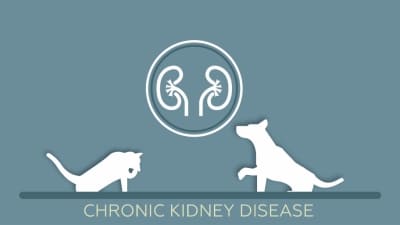
Reduced phosphorus intake and its digestive chelation by chitosan help maintain healthy kidney function.
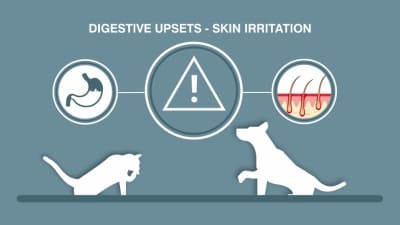
To avoid food allergies, our food does not contain beef, dairy, egg, wheat, corn, gluten or soy (ingredients that can cause food allergies), which reduces the risk of food intolerance.
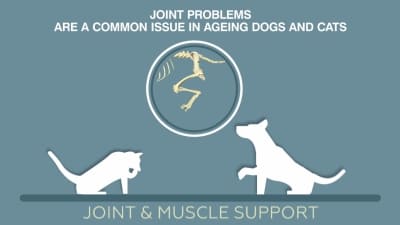
High protein content and chondroitin and chitosan supplementation contribute to the proper functioning of the musculoskeletal system
Composition :
Dehydrated pork and poultry proteins, Rice (min. 4%), Lignocellulose, Animal fats, Hydrolysed pork and poultry proteins, Minerals, Linseed, Beet pulp, Psyllium fibre (Plantago (L.) spp.), Fructo-oligosaccharides, Brewers yeast, Yucca schidigera, Hydrolysed crustacean (source of chitosan), Lactobacillus acidophilus, Chondroitin sulphate.
VETERINARY HPM® does not contain any artificial flavours or colourants
| Analytical constituents (% as fed) |
|
|---|---|
| Moisture | 9 % |
| Protein | 29 % |
| Animal to vegetal protein ratio | 88/12 |
| Fat | 14 % |
| Minerals | 7,5 % |
| Crude Fibre | 7,5 % |
| NFE * | 33 % |
| Starch | 26 % |
| Calcium | 1,3 % |
| Phosphorus | 1 % |
| Sodium | 0,4 % |
| Omega-6 | 2,2 % |
| Omega-3 | 0,7 % |
| ME** calculated | 338 kcal/100g |
| ME** measured in vivo | 345 kcal/100g |
| * Extractif Non Azoté : glucides assimilables ** Energie métabolisable |
|
| Functional ingredients | |
|---|---|
| Bentonite | 8 g/kg |
| Killed lactobacilli | 7 mg/kg |
| Yucca schidigera extract | 0,06 % |
| L-carnitine | 330 mg/kg |
| Chondroitin sulfate | 215 mg/kg |
| Chitosan | 215 mg/kg |
| Vitamins and trace elements | |
|---|---|
| Vitamin A | 11 000 IU/kg |
| Vitamin D3 | 1 100 IU/kg |
| Vitamin E | 570 mg/kg |
| Vitamin B1 | 3,8 mg/kg |
| Vitamin B2 | 11 mg/kg |
| Vitamin B3 | 30 mg/kg |
| Vitamin B5 | 26 mg/kg |
| Vitamin B6 | 3 mg/kg |
| Vitamin B9 | 0,48 mg/kg |
| Vitamin B12 | 0,062 mg/kg |
| Choline | 740 mg/kg |
| Taurine | 1 500 mg/kg |
| Copper | 15 mg/kg |
| Iron | 25 mg/kg |
| Iodin | 1,1 mg/kg |
| Zinc | 120 mg/kg |
It is advisable to follow the ration table and make fresh water available.
| Weight of the dog (kg) | Daily Ration (g/day)* | ||
|---|---|---|---|
| Little activity | Normal activity | Very active | |
| 11 | 165 | 185 | 200 |
| 15 | 200 | 225 | 245 |
| 20 | 245 | 270 | 300 |
| 25 | 285 | 315 | 350 |
| 30 | 320 | 355 | 395 |
| 35 | 355 | 395 | 435 |
| 40 | 390 | 430 | 475 |
| 45 | 420 | 470 | 515 |
| 50 | 450 | 500 | 550 |
| 60 | 510 | 565 | 625 |
| 70 | 565 | 630 | 690 |
|
* These amounts are approximate and may vary depending on the breed of dog and activity levels. For further information, please consult your veterinary surgeon. |
|||
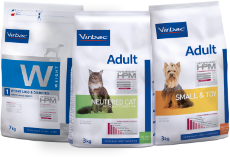
- Can I feed my puppy with a home-made diet?
The food that puppies receive throughout their first year must obviously provide energy and materials to build the skeleton, muscles, and all new tissues. But nutrition does not stop there, it must also help puppies develop a fully functioning nervous system and effective immune system. Any deficiency in essential nutrients (those which cannot be synthesized by the animal's body) during this very delicate period may affect the dog's future health.
Many recipes developed by veterinary nutritionists are available for owners who wish to prepare a nutritionally balanced home-made diet for their puppy dog food needs. However, it is illusory to succeed in respecting all the required conditions because the nutritional balance of a household ration is subject to various hazards. The owner will always find it difficult to follow the recipe exactly, the necessary ingredients are not always available, and the nutritional composition of the ingredients can vary considerably depending on the origin of the product. When preparing a home-made diet, no laboratory analysis can verify the nutritional composition of the raw materials used!
Therefore, even when accompanied by the distribution of a mineral and vitamin supplement, home-made diets for dogs often show deficiencies in some essential nutrients. For a safer and more balanced alternative, consider feeding your pet a high protein food for puppies designed to support proper development. Commercially prepared dry puppy food options are often the best puppy dog food choices for consistency and reliability.
- Can I feed my puppy with a vegetarian diet?
The dog is a carnivore, which means that certain nutrients it needs cannot be provided by a plant-based diet. Such diets can cause major nutritional deficiencies with serious consequences on health. For this reason, a puppy should never be fed a vegetarian diet. Instead, opt for puppy dog food that meets its natural dietary requirements—particularly high protein food for puppies in a dry puppy food form that is considered among the best puppy dog food options.
- Can I feed my puppy with raw meat diets?
Raw meat diets (red meat or chicken) are often deficient in calcium and phosphorus. The Calcium/Phosphorus ratio is totally inappropriate for the canine species, especially in terms of bone growth. Such a diet can cause major nutritional deficiencies with serious consequences on health. For example, when fed exclusively a raw meat diet, the puppy is exposed to the risk of pathologic fractures following minor trauma.
To avoid these risks, it is advisable to feed your pup a scientifically balanced dry puppy food. These formulas are designed as high protein food for puppies and are considered by many veterinarians as the best puppy dog food to ensure long-term health and development.

more than 6 vets out of 10 recommend our food
(source: GIE AC 2020 survey, 1519 responses)

on average, our food is rated above 4/5
(source: * conso animo, shopmium, que choisir and 60 millions conso)

94% acceptance for medium and large dogs, 92% for small and very small dogs and 84% for cats


